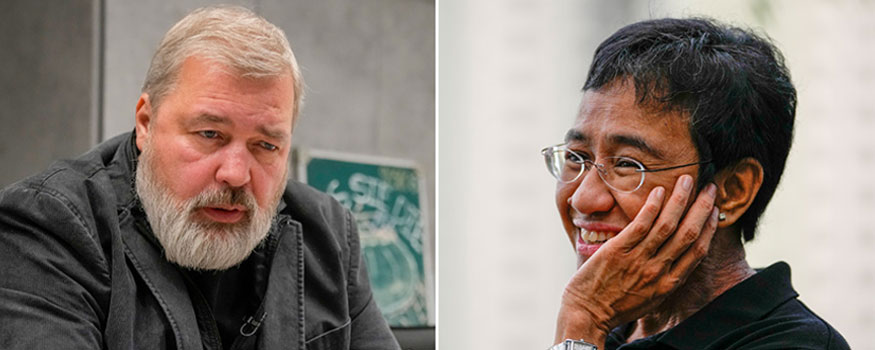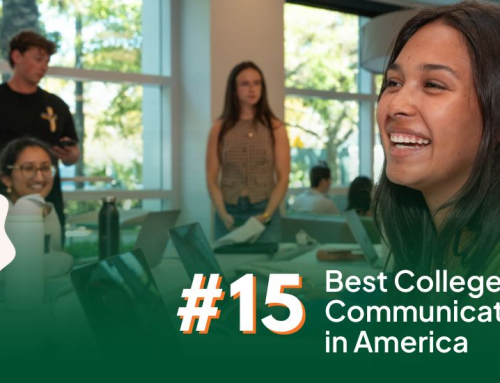By Sallie Hughes
School of Communication professor Sallie Hughes stresses the importance of journalism as an institution following The Nobel Peace Prize announcement, which recognized the professional and personal sacrifices of journalists Dmitry Muratov of Russia and Maria Ressa of the Philippines.
Earlier this month journalists Maria Ressa of the Philippines and Dmitry Muratov of Russia were awarded the Nobel Peace Prize. Both lead news organizations known for producing investigative exposés on government abuses of power at great risk.
Muratov has lost six of his colleagues to murder or suspicious death because of their work criticizing the Russian government, and in particular, Vladimir Putin. Ressa has been jailed and violently harassed and faces a relentless slew of charges and lawsuits for her organization’s work revealing the gross violations of human rights and manipulative disinformation campaigns of the government of President Rodrigo Duterte. If convicted, she faces years behind bars.
The Norwegian Nobel Committee awarded the prestigious prize to the two journalists as individuals and also as representation of journalists worldwide, noting that fact-based investigative journalism is a precondition for democracy and lasting peace.
Journalism organizations, including Reporters Without Borders, with which I have had the privilege to collaborate in recent years, celebrated this “Journalism Peace Prize,” as Norwegian journalist Stig Arild Pettersen called it, because The Nobel Peace Prize elevates to the world stage the risks and roles journalists undertake as troubled democracies backslide or fail.
With the weakening of democracy as a rights-based political regime over the last quarter century, journalists have been increasingly harassed, jailed, and murdered by politicians, state security, criminals, and other defacto powers. In a 2019 publication, University of Miami Ph.D. student Yulia Vorobyeva and I showed that of 1,812 killings of journalists worldwide from 1992 to 2016, countries with hybrid political regimes mixing liberal and illiberal elements create by far the most dangerous context for journalists. This is because journalists in these countries, such as Ressa and Muratov, take on the classical democratic ideal of journalism by holding those in power accountable, even though the rule of law is not sufficiently strong to protect the reporters.
The award of a Nobel Peace Prize to journalists highlights important lessons for a world at a crossroads. Peace is more than the absence of war. Lasting peace requires the strengthening of structural conditions such as accountable government, protections for human rights, policies promoting fairness and equity, the elevation of voices in dialogue rather than conflict or hatred, and contextualized understanding of the sources and beneficiaries of conflict.
Journalism and media more broadly may play dual roles when it comes to building sustained peace. Commercially driven news values and discriminatory representations in film, television, and gaming highlight conflict, negativity, and magnitude to increase audience. But ethical, empathetic journalism in the public interest can strengthen each of the foundations of peace and social resilience by shedding light on abuses and hidden beneficiaries of conflict, giving voice to the marginalized and oppressed, and presenting differing experiences and viewpoints in context and dialogue.
Journalism cannot resolve corruption, conflict, inequity, or hate on its own, but it can work against them, enabling and amplifying other institutions and individuals who together may change public opinion, policy and, over the long term, the way we think and interact with each other.
For peace to be sustained and democracy to protect rights and enable social justice, journalism needs to exist as an institution supporting accountability and societal cohesion.
Given the financial and political pressures most journalists and news organization work under, including being targeted by disinformation campaigns and threats, it requires a normative commitment to ethical, empathetic, factually precise, and unyielding journalism. Academic studies have shown again and again that commitment to pro-public norms drive journalists who continue to work at great risk.
“Journalism is my passion and if we are silenced, then they win,” said a Mexican journalist in a study of coping and resilience sociology that Ph.D. student Laura Iesue and I published with Mexican colleagues last year. “I feel a personal responsibility. This is the [place] where I stake out my position of resistance in the face of everything that is happening,” said another. Both were explaining why they stayed in journalism despite threats.
Recognizing the personal commitment, the Nobel committee recognized journalists’ professional and personal sacrifice when making its award.
“We wanted to illustrate what it means to dedicate your life to such an important task as this and to highlight two persons who have been extraordinary, courageous, and also represent very professional journalism of high quality. So, it was our decision that these two individuals by their example really are excellent representatives for the profession,” Nobel committee chair Berit Reiss-Andersen told journalist Stig Arild Pettersen immediately after the announcement.
Then she wished him congratulations, too, because it was also Pettersen’s prize.
Our journalism students learn these ethical commitments from professors of practice and scholars at the University of Miami School of Communication. Their emerging professional values are reinforced in the many national and regional awards won annually by UMTV, Distraction magazine, and The Miami Hurricane.
Boriana Treadwell, faculty advisor to UMTV and former producer for CNN and CNN International, worked closely with Ressa when she ran CNN’s Manila and Jakarta bureaus several years ago.
“She is constantly on the authorities’ radar and they are watching her every move—but that hasn’t stopped her from doing her job and standing up for press freedom, democracy, and the truth,” Treadwell said. “She is one of the most humble people I know. She believes in doing her job no matter what. Maria is fearless and dedicated and the brightest example of how this job should be done for both student and professional journalists.”
Sallie Hughes is a professor and associate dean for Global Initiatives at the School of Communication, and a research fellow for crime, corruption, and conflict at the University’s Institute for Advanced Study of the Americas.







